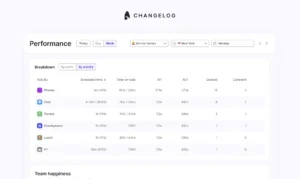
Top 7 call centre scheduling best practices

Call centre managers have a hard time tracking who’s doing what and when. That makes scheduling an integral part of any contact centre.
Call centre scheduling allows surfers (the name we use for “agents”) and team leaders to plan their shift patterns in advance, knowing when they need to work and what they need to do while on their shift.
In this blog post, we’ve laid out some call centre scheduling best practices for team leaders and surfers. These will help both parties get the best out of their scheduling process and delight customers as a result.
What is call centre scheduling?
Call centre scheduling involves planning and managing surfers and their tasks in a way that helps them achieve optimum performance.
Simply put, contact centre scheduling requires managers to go through daily rosters, set weekly schedules, track call volumes, forecast, and track surfer’s availability. In short, call centre scheduling is much more work than it seems.
However, you can adapt to a few best practices to make things easier. They are discussed below.
Top 7 call centre scheduling best practices
Call centre scheduling comes with challenges. But we’re pretty positive that you can ensure optimal performance if you’re mindful of a few best practices. So, check these out👇
Empower surfers to choose shifts based on their availability
When planning your call centre shift schedules, allow surfers to choose shifts that suit their lifestyle. This practice is not only conducive to the productivity of a call centre, but it also increases morale, improves work-life balance, and leads to happier surfers. Also, including surfers in the shift planning and workforce scheduling processes ensure better collaboration.
Publish shifts well in advance
Notify your surfers of their shifts before they are scheduled to work. 30% of shift workers get one week or less notice of their shifts, impacting contact centre metrics (SLAs, KPIs, and quantitative indicators).
Additionally, allowing surfers to have visibility over when they are working can have much more lasting impacts. This is especially true when planning call centre night shift schedules.
If a contact centre can forecast demand and publish shift plans in advance (we advice you do it 8 weeks beforehand but our scheduling can be published at a different time than when it is drafted), it should help you outweigh the negatives. In short, planning well in advance positively impacts Surfer’s well-being, productivity, job satisfaction, and overall customer experience.
Embrace remote working
There has been a clear shift towards remote work in the past few years. Most companies had to transform their workforce from in-office to remote in weeks or even days. So, we can conclude that remote working is here to stay. In fact, a study by Gartner revealed that 70% of customer support agents want to continue working from home at least once a week.
Global companies often operate 24/7, meaning they must support customers in different time zones. As a result, they need geographically distributed teams to ensure customer support at all times.
Simply put, a remote working model allows contact centres to organise surfers to cover customer support requests regardless of their location or time zone.
💡Quick tip: A 24/7 call centre schedule can help you plan your rotating shifts effectively for your remote teams.
Make team visibility a priority
Contact centre scheduling, in an ideal world, is simple. Listen to your surfers, plan a fair schedule around their individual shift patterns, consider time offs and breaks, and off you go. Easy.
However, in reality, it’s not that simple. Teams should be able to see who’s working on the same shift and their activities (phone, live chat, email, admin tasks) throughout the day. Doing so allows teams to respond to sudden changes in demand and to adapt accordingly.
Giving the support team visibility of your call centre schedule template enables them to track the activities and shifts of fellow surfers and managers. Thus, it ensures improvement in customer support, increases team rapport, and leads to happier managers and surfers.
⭐Here’s a quick review of our team view feature by Maja from Wolf & Badger (a Surfboard customer).
“Giving the Team visibility into others’ schedules saves us time, makes us more efficient, and ensures a smoother operation.”
Document surfers’ skills and the nature of calls managed
This is one of the most underrated call centre scheduling best practices. As a manager, you must have a good grasp on the diverse skill set of your surfers – how each operates, their specialization, and their areas of interest and preferences. This will help you allocate tasks more efficiently. Also, task completion will be easier and more seamless.
Offer surfers variety at work
As they say, variety is the spice of life, and it applies to call centre operations as well. Give your surfers the freedom to exercise their creativity. Also, ensure they can work for lesser days while maintaining the same allocated hours. Additionally, you can keep the start and end times of their shifts flexible. Remote work can also be an option to let surfers work from home for a specific number of days.
Implement contact centre scheduling software
The final call centre scheduling best practice is leveraging a call centre scheduling software that best fits your business needs.
Many contact centres still use spreadsheets to schedule their surfers. But that becomes challenging once you have different shift patterns, multiple daily activities, shift swapping, shift rotations, and changing demand levels throughout the day.
That’s when you need workforce management platforms to create a productive and purposeful contact centre team.
Choose a scheduling software that empowers surfers with flexibility and autonomy. This is the most human-centric and strategically sensible way forward. Surfboard’s contact centre scheduling software simplifies managers’ scheduling process while maintaining employee happiness and satisfaction.
Wrapping up
As we said, the call centre world isn’t Utopia. It has operational challenges that demand implementing a few call centre scheduling best practices.
While our list of best practices will be helpful, scheduling software is the need of the hour. So, if you find it overwhelming to manage call centre operations, Surfboard can make your life easier.
The platform can help you quickly plan shifts, analyse data and forecasts, get a detailed view of your team’s tasks, and so on.
Explore the product to see how it works, or contact us for a quick tour.
FAQs
What is schedule adherence?
Schedule adherence is a performance metric that shows how effectively agents follow their assigned work schedules. This metric refers to a percentage of the working day when an agent is available to handle calls.
Why is scheduling important in a call centre?
Call centre scheduling is important to ensure ease in workflow and operations. It involves planning surfers’ activities beforehand to ensure achieving goals and priorities within the available time. Effective scheduling also ensures employee well-being along with better management.



